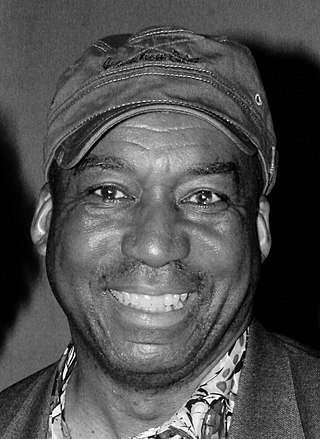
Public Enemy is an American hip hop group formed by Chuck D and Flavor Flav on Long Island, New York, in 1985. The group rose to prominence for their political messages including subjects such as American racism and the American media. Their debut album, Yo! Bum Rush the Show, was released in 1987 to critical acclaim, and their second album, It Takes a Nation of Millions to Hold Us Back (1988), was the first hip hop album to top The Village Voice's Pazz & Jop critics' poll. Their next three albums, Fear of a Black Planet (1990), Apocalypse 91... The Enemy Strikes Black (1991) and Muse Sick-n-Hour Mess Age (1994), were also well received. The group has since released twelve more studio albums, including the soundtrack to the 1998 sports-drama film He Got Game and a collaborative album with Paris, Rebirth of a Nation (2006).

Rapping is an artistic form of vocal delivery and emotive expression that incorporates "rhyme, rhythmic speech, and [commonly] street vernacular". It is usually performed over a backing beat or musical accompaniment. The components of rap include "content", "flow", and "delivery". Rap differs from spoken-word poetry in that it is usually performed off-time to musical accompaniment. It also differs from singing, which varies in pitch and does not always include words. Because they do not rely on pitch inflection, some rap artists may play with timbre or other vocal qualities. Rap is a primary ingredient of hip hop music, and so commonly associated with that genre that it is sometimes called "rap music".

An anachronism is a chronological inconsistency in some arrangement, especially a juxtaposition of people, events, objects, language terms and customs from different time periods. The most common type of anachronism is an object misplaced in time, but it may be a verbal expression, a technology, a philosophical idea, a musical style, a material, a plant or animal, a custom, or anything else associated with a particular period that is placed outside its proper temporal domain.
West Coast hip hop is a regional genre of hip hop music that encompasses any artists or music that originated in the West Coast of the United States. West Coast hip hop began to dominate from a radio play and sales standpoint during the early to-mid 1990s with the birth of G-funk and the emergence of record labels such as Suge Knight and Dr. Dre's Death Row Records, Ice Cube's Lench Mob Records, the continued success of Eazy-E's Ruthless Records, Dr. Dre's Aftermath Entertainment, and others.

Nathaniel Thomas Wilson, better known by his stage name Kool G Rap, is an American rapper. He began his career in the mid-1980s as one half of the group Kool G Rap & DJ Polo and as a member of the Juice Crew. He is widely considered to be one of the most influential and skilled MCs of all time, and a pioneer of mafioso rap/street/hardcore content and multisyllabic rhyming. On his album The Giancana Story, he stated that the "G" in his name stands for "Giancana", but on other occasions he has stated that it stands for "Genius".
Wigger or Wigga is a term for a white person of European ethnic origin who emulates the perceived mannerisms, language, and fashions associated with African-American culture, particularly hip hop. The term is a portmanteau of white and nigger, or white nigger.

African-American music is a broad term covering a diverse range of musical genres largely developed by African Americans and their culture. Its origins are in musical forms that developed as a result of the enslavement of African Americans prior to the American Civil War. It has been said that "every genre that is born from America has black roots."

William Michael Griffin Jr., better known by his stage name Rakim, is an American rapper. He is one half of golden age hip hop duo Eric B. & Rakim, with whom he released four albums: Paid in Full (1987), Follow the Leader (1988), Let the Rhythm Hit 'Em (1990), and Don't Sweat the Technique (1992). He also released three solo albums: The 18th Letter (1997), The Master (1999), and The Seventh Seal (2009).
African American literature is the body of literature produced in the United States by writers of African descent. It begins with the works of such late 18th-century writers as Phillis Wheatley. Before the high point of enslaved people narratives, African American literature was dominated by autobiographical spiritual narratives. The genre known as slave narratives in the 19th century were accounts by people who had generally escaped from slavery, about their journeys to freedom and ways they claimed their lives. The Harlem Renaissance of the 1920s was a great period of flowering in literature and the arts, influenced both by writers who came North in the Great Migration and those who were immigrants from Jamaica and other Caribbean islands. African American writers have been recognized by the highest awards, including the Nobel Prize given to Toni Morrison in 1993. Among the themes and issues explored in this literature are the role of African Americans within the larger American society, African American culture, racism, slavery, and social equality. African-American writing has tended to incorporate oral forms, such as spirituals, sermons, gospel music, blues, or rap.

Carl Dobson, better known by his stage name Crazy Titch, is a British grime MC who is now serving a life sentence for murder. Crazy Titch was a successful and well-known grime MC during his active period.

Political hip hop is a subgenre of hip hop music that was developed in the 1980s as a way of turning hip hop into a form of political activism. Political hip hop generally uses the medium of hip hop music to comment on sociopolitical issues and send political messages to inspire action, create social change, or to convince the listener of a particular worldview. It was inspired partially by politically-focused 1970s artists such as The Last Poets and Gil Scott-Heron, as well as the Black Power movement and revolutionary politics of the 1960s and 1970s. Various hip hop artists emerged in the late 1980s espousing political messages and providing social and political commentary with KRS-One and his group Boogie Down Productions and Public Enemy in particular establishing themselves as some of the first predominantly political hip hop groups with albums in 1988. Soon to follow in 1989 and following years were other Political rappers, or known as "Conscious rap" including such groups as X-Clan, Poor Righteous Teachers, Paris (rapper), Disposable Heroes of Hiphoprisy and others The genre has helped to create a new form of social expression for subordinate groups to speak about their exclusions, injustices, and lack of power.
The Franklin Prophecy, sometimes called the Franklin Forgery, is an antisemitic speech falsely attributed to Benjamin Franklin, warning of the supposed dangers of admitting Jews to the nascent United States. The speech was purportedly transcribed by Charles Cotesworth Pinckney during the Constitutional Convention of 1787, but was unknown before its appearance in 1934 in the pages of William Dudley Pelley's Silver Legion pro-Nazi magazine Liberation. No evidence exists for the document's authenticity, and some of Pelley's claims have actively been disproven.
Hip-Hop: Beyond Beats and Rhymes is a 2006 documentary film written, produced, and directed by Byron Hurt. The documentary explores the issues of masculinity, violence, homophobia, and sexism in hip hop music and culture, through interviews with artists, academics, and fans. Hurt's activism in gender issues and his love of hip-hop caused him to feel what he described as a sense of hypocrisy, and began working on the film. The premiere of the film took place at the Sundance Film Festival, and was welcomed by a standing ovation. It has also won Best Documentary at the San Francisco Black Film Festival and the Audience Award at the Roxbury Film Festival. On February 20, 2007 the film aired on the PBS Emmy-winning documentary series, Independent Lens.

The Death of Willie Lynch is the debut album released by Black Ice, an African-American rapper and poet. Although originally signed to Def Jam Records, Black Ice was thankful to have this album released by the indie label Koch Records. Eric "Booty" Greene handled the production for this album.

Dwayne Mahorn, better known by his stage name Durrty Goodz, is a British grime MC, rapper and songwriter from London. He is known for his versatility across his tracks with a flow that fuses many styles, from dancehall to reggae to hip-hop and bashment, evoking artists as disparate as Ludacris, Kardinal Offishall and Pharoahe Monch. He is known for his lyricism, flow and wit on the mic.
Hip-hop or hip hop music, also known as rap, and formerly as disco rap, is a genre of popular music that originated in the early 1970s from African Americans and Afro-Caribbean immigrants in the Bronx, a borough of New York City. Hip-hop music originated as an anti-drug and anti-violence genre consisting of stylized rhythmic music that often accompanies rapping, a rhythmic delivery of poetic speech. In the early 1990s, a professor of African American studies at Temple University said, "hip hop is something that blacks can unequivocally claim as their own." By the 21st century, the field of rappers had diversified by both race and gender. The music developed as part of the broader hip hop culture, a subculture defined by four key stylistic elements: MCing/rapping, DJing/scratching with turntables, breakdancing, and graffiti art. While often used to refer solely to rapping and rap music, "hip hop" more properly denotes the practice of the entire subculture. The term hip hop music is sometimes used synonymously with the term rap music, though rapping is not a required component of hip hop music; the genre may also incorporate other elements of the culture, including DJing, turntablism, scratching, beatboxing, and instrumental tracks.

The Revolution Will Not Be Televised is a compilation album by American poet Gil Scott-Heron. It was released in 1974 by Flying Dutchman Records and titled after Scott-Heron's 1971 song of the same name.
Misogyny in rap music is defined as lyrics, videos, or other components of rap music that encourage, glorify, justify, or legitimize the objectification, exploitation, or victimization of women. It is an ideology that depicts women as objects for men to own, use, and abuse. It reduces women to expendable beings. It might include everything from innuendos to stereotypical characterizations and defamations.

William Jelani Cobb is an American writer, author, educator, and dean of the Columbia Journalism School.

James G. Spady was an American Book Award-winning writer, historian, and journalist. Over his fifty-year career, Spady authored and edited numerous books, worked in radio, television, and film, wrote hundreds of newspaper articles for various print media, and received the National Newspaper Publishers Association's Meritorious Award.













